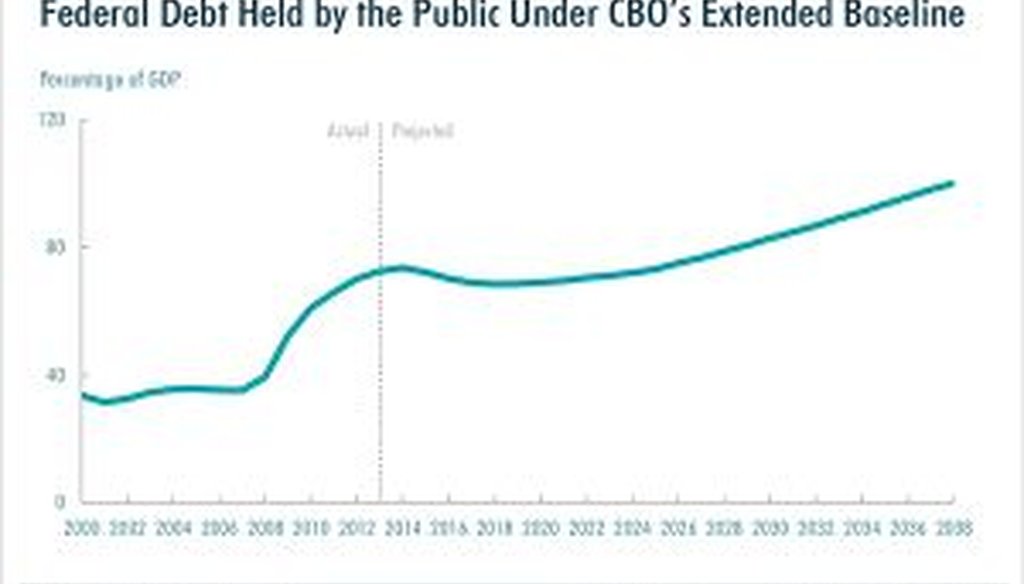Stand up for the facts!
Our only agenda is to publish the truth so you can be an informed participant in democracy.
We need your help.
I would like to contribute

This chart from the Congressional Budget Office shows federal debt levels projected to rise through 2038.
What word starts with "d" and ends with "t" and has to do with the federal budget?
You’d be right if you said "debt." You’d also be right if you said "deficit." But while the two words sound the same, they describe very different concepts. One is getting bigger, while the other is getting smaller. The politicians and talking heads don’t make things easier by confusing the two.
It’s a mistake we’re seeing more often, especially from Democrats who want to defend President Barack Obama’s fiscal policies.
The latest offender: the Senate’s second-ranking Democrat, Dick Durbin of Illinois. In an interview on Fox News Sunday last week, Durbin said the Obama administration was going to "reduce the overall debt of the United States by $3 trillion over the next 10 years."
Sorry, but his talk about the overall debt was ridiculously wrong. Instead of going down $3 trillion, the best estimate of the debt over the next 10 years is that it will rise by $8.6 trillion.
That's a difference of ... $11.6 trillion. That's real money to anyone. PolitiFact rated his statement Pants on Fire!
Democrats do have a point when they say that the federal deficit is going down. The deficit is a measure of a single year’s shortfall, the difference between what the government takes in and what it spends. And in recent years, the deficit has been declining, thanks to the end of the recession and lower government spending.
The deficit hit a mind-boggling $1.41 trillion in 2009 during the teeth of the recession, due to a fall off in tax revenues and an economic stimulus aimed at jump-starting the economy. It gradually declined somewhat, but still stayed north of $1 trillion in 2010, 2011 and 2012. The nonpartisan Congressional Budget Office said those years marked the largest budget deficits relative to the size of the economy since 1946.
But with the end of the Great Recession, deficits are getting smaller. The deficit for 2013 is expected to finally drop below the $1 trillion mark, to $973 billion. The Obama administration predicts further declines through 2018, when they project the deficit will be $475 billion.
But the deficits aren’t going away. If they did go away, then there would be what’s called a budget surplus. The United States hasn’t seen budget surpluses since the days of President Bill Clinton.
So years of deficits, even deficits that are growing smaller, still means the overall debt is getting bigger.
Got it?
The fiscal future
Sometimes, though, you hear people on TV talk about the debt going down, and that’s wrong. When PolitiFact has fact-checked the claim -- usually from Obama supporters -- the explanation is typically that they said "debt" when they meant "deficit."
Back in November, for example, Al Sharpton said on his MSNBC show PoliticsNation that the national debt "has been reduced every year for the last five years." He meant deficits. PunditFact, the PolitiFact project that rates the talking heads, rated his statement False.
And even if some are feeling cheerful about declining deficits, the Congressional Budget Office warns that shrinking deficits won’t last if the nation keeps to its current spending and taxing policies. Deficits will begin to increase in years to come, and continue increasing for the next 25 years, through 2038.
Much of that deficit spending will be driven by spending on health care -- especially Medicare, the government insurance program for people over age 65 -- and Social Security, according to the CBO’s latest report. The agency issued a warning along with its usual graphs and charts:
"The unsustainable nature of the federal government’s current tax and spending policies presents lawmakers and the public with difficult choices. Unless substantial changes are made to the major health care programs and Social Security, those programs will absorb a much larger share of the economy’s total output in the future than they have in the past."
We see no end in sight to conversation and commentary about deficits and debt. So keep this in mind:
Deficit=one year.
Debt=all money owed.
Our Sources
See individual fact-checks for complete sources.























































